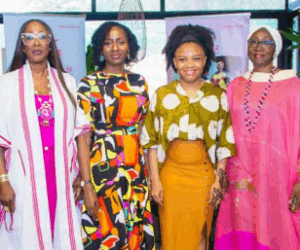1
Kemi Bamiro is the founder of SANTH Technologies Limited, a product manager and UX researcher with a passion for making life easy for Nigerian youths through technology with product-led designs. In this interview with VICTORIA OJUGBANA, she shares her passion to shape the destinies of Nigerian youths through orchestrated technology brands within Fintech, Edutech and e-commerce, among others. Excerpts:
Can you tell us about your technology company?
SANTH Technologies is a promising privately-owned technology firm and a strong advocate for youth and women empowerment through AI and digital education.
It provides a space for them to generate revenue, drive growth, profitability and provide user-focused solutions through strategic creation of user-centered products and user-stories connections with best products.
What role has your tech company played in helping to project youths in Nigeria and Africa as a whole?
SANTH Technologies has organized training sessions/learning platforms via her YouTube channel and humanitarian outreach, influenced marketing of e-learning apps, collaborated with brands in the development of innovative apps to empower youths at large to learn, unlearn, and relearn basic but essential digital skills as a HACK (using the GENZ context) to redefine their world.
For Nigerian youths to thrive in this digital age, it is important they seize the advantage of shaping and birthing their destinies in a comprehensive and inclusive digital education strategy that ensures that every Nigerian child is not only literate but also digitally empowered.
What impact has SANTH Technologies training had on the youth?
For now, SANTH Technologies Limited has been able to impact Nigerian youths positively in the sense that they have been made technology aware and technology compliant.
Many people came to the firm without knowing how to handle a mouse. Some of them did not even know how to login to computers, but today, there is nothing that they do not know about the use of technology. I am talking about the latest and trending apps in the world. That is how far my firm has gone in training youths of the country.
So far, how many people has your firm been able to impact?
I am also the founder of SANTH Technologies – a promising private owned business and a strong advocate for youth and women empowerment through AI and digital education.
SANTH Technologies has been able to mentor hundreds of Nigerian youth in the area of AI and technology applications.
We have also implemented a Fintech platform that has benefited quite a number of Nigerian youths and others. We have been able to mentor them by virtual training and physical tutorials.
What makes your brand unique?
My brand is different from others because we focus on driving empathy for understanding user needs, and a deep commitment to deliver experiences that resonate with people’s connections with best products.
We strive to deliver innovative, user-focused solutions that bridge the gap between user needs and business objectives, thereby delivering products that leave a dent in the user’s mind. Example of such a product is a Fintech app called Paypetal – Secure, Fast & Flexible Digital Payments Anywhere with Near Field Communication. These are things that you may not find in other technology companies.
Tell us about your challenges in the male-dominated tech industry and how you have been able to overcome, as well as navigate through them?
One of the main challenges I face in the technology industry as a woman is gender bias. When you appear before an interview panel /forum for a contract and you are stunted with a sneering glance of your capability to strive in this tech business as a female counterpart. However, I have always overcome this by engaging myself with continuous learning of new skills to measure up with the male counterparts in the digital markets.
Can you tell us about the most rewarding part of your journey so far?
To me, I can say that the most rewarding part of this journey is seeing ideas become real products that solve user problems, making every day easier through the utilization of digital tools and improving people’s experiences.
What are your greatest feats or achievements in the industry so far?
What I can say now is my greatest achievement in the technology industry is that of my ability to implement fundamental changes on how we live and work. Solving real user problems through technology innovation and also being an advocate for youth and women empowerment via AI and digital literacy have all become my major achievements as a technology expert.
I am a brand ambassador of a payment solution called Paypetal that combines all your financial tools into one sleek, user-friendly app. We go beyond the ordinary by experiencing Nigeria’s first NFC-based Fintech, where multiple cards and seamless transactions are unlocked faster, with contactless payments with PayPetal’s NFC Power.
Whether you’re paying for groceries, making subscriptions of Airtime, Internet Data, Electricity Bills & utilities, managing cards, or analyzing expenses, splitting a bill with friends, or transferring money to your savings account, Paypetal will not only make your financial transactions as smooth and effortless as possible but also encompass you with a shield.
What skills do you advise Nigerian youths to acquire in the area of technology to make them employable?
Software skills such as SQL, JAVA, PYTHON, Frontend and Backend developer, among others. Graphic design skills such as Canva, UI/UX Design, photo & video editing, HTML, JavaScript, CSS, Data Analysis skills such as Power BI, Tableau, R coding will make Nigerian youths sellable in the job market.
The integration of AI is significantly changing Nigeria’s education system, with quantifiable benefits such as World Bank pilot programmes, which demonstrates that students could learn two years’ worth of content in six weeks with AI tutors.
What advice do you have for the youth on becoming technology aware?
My advice for youths is to proactively seize the advantage of their world – GENZ (technology era) to learn basic but essential digital skills as a HACK (using the GENZ context) to shape and birth their destinies.
What is your message to the Nigerian government to ensure that the youth are technology compliant and technology aware?
The government should integrate comprehensive digital literacy curricula into primary and secondary education, ensuring students learn basic computer skills, internet safety, and emerging technologies like AI and blockchain.
Also higher institutions need updated ICT programs aligned with industry demands, while teacher training programs must equip educators with modern technological skills. They should generously invest in digital education by starting from the grassroots and rural communities.
What is your advice to the Nigerian government on the issue of embracing technology?
My advice to the government is to embrace technology tools and AI’s potential while proactively managing risks through comprehensive planning, ethical guidelines, and public engagement.
The key thing is for the government to begin early with pilot programmes, learning from implementation, and maintaining flexibility to adapt policies as the technology evolves.
By embracing technology, the issues of poverty and basic infrastructure like electricity still exist and must be addressed with technological advancement.
In general, Nigeria is putting itself as an emerging AI hub in Africa; however, success hinges on striking a balance between technological advancement and basic infrastructure requirements.
Kemi Bamro is the founder of SANTH Technologies Limited, a product manager and UX researcher with a passion for making life easy for Nigerian youths through technology with product-led designs. In this interview with VICTORIA OJUGBANA, she shares her passion to shape the destinies of Nigerian youths through orchestrated technology brands within Fintech, Edutech and e-commerce, among others. Excerpts: Also, my advice to the government is that they should integrate comprehensive digital literacy curricula into primary and secondary education, ensuring students learn basic computer skills, internet safety, and emerging technologies like AI and blockchain. Also higher institutions need updated ICT programs aligned with industry demands, while teacher training programs must equip educators with modern technological skills. They should generously invest in digital education by starting from the grassroots and rural communities. Currently, 72 Nigerian universities offer AI programmes. AI acts as virtual tutors, improves engagement, and offers personalized learning, as well as provides affordable solutions to traditional classroom constraints.
What is your advice to parents on the issue of ensuring that their children are tech-complaint?
My advice to parents and guardians is that they should strive to ensure that their children are technology compliant and technology aware. With that, Nigerian youths will be able to earn money online and be able to compete with their counterparts globally.
We know that things are a bit difficult in the country, but I will advise that parents should go out of their way to provide phones for their children and ensure that they use them positively. On the part of the children and students, I will advise that they should use technology positively to impact their generation, make money for themselves and get ready to stay with their counterparts all over the world.






